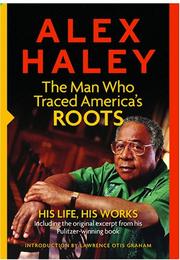


firebrand and Black empowerment activist, tells the extraordinary story of his life and the growth of the Human Rights movement. In this searing classic autobiography, originally published in 1965, Malcolm X, the Muslim leader. Experience a bold take on this classic autobiography as it's performed by Oscar-nominated Laurence Fishburne. One of Time's ten most important nonfiction books of the 20th century. But Rootsspeaks, finally, not just to blacks, or to whites, but to all people and all races everywhere, for the story it tells is one of the most eloquent testimonials ever written to the indomitability of the human spirit.The Autobiography of Malcolm X: As Told to Alex Haley (Audio CD / Audio, Unabridged edition)īy Malcolm, X. He has rediscovered for an entire people a rich cultural heritage that slavery took away from them, along with their names and their identities. As the first black American writer to trace his origins back to their roots, he has told the story of 25,000,000 Americans of African descent. Now he has written the monumental two-century drama of Kunta Kinte and the six generations who came after him-slaves and freedmen, farmers and blacksmiths, lumber mill workers and Pullman porters, lawyers and architects-and one author.īut Haley has done more than recapture the history of his own family.

On September 29, 1967, he stood on the dock in Annapolis where his great-great-great-great-grandfather was taken ashore on September 29, 1767. Haley has talked in Juffure with his own African sixth cousins. It took ten years and a half a million miles of travel across three continents to find it, but finally, in an astonishing feat of genealogical detective work, he discovered not only the name of “the African”–Kunta Kinte-but the precise location of Juffure, the very village in The Gambia, West Africa, from which he was abducted in 1767 at the age of sixteen and taken on the Lord Ligonier to Maryland and sold to a Virginia planter.

Still vividly remembering the stories after he grew up and became a writer, Haley began to search for documentation that might authenticate the narrative. When he was a boy in Henning, Tennessee, Alex Haley’s grandmother used to tell him stories about their family-stories that went back to her grandparents, and their grandparents, down through the generations all the way to a man she called “the African.” She said he had lived across the ocean near what he called the “Kamby Bolongo” and had been out in the forest one day chopping wood to make a drum when he was set upon by four men, beaten, chained and dragged aboard a slave ship bound for Colonial America.


 0 kommentar(er)
0 kommentar(er)
